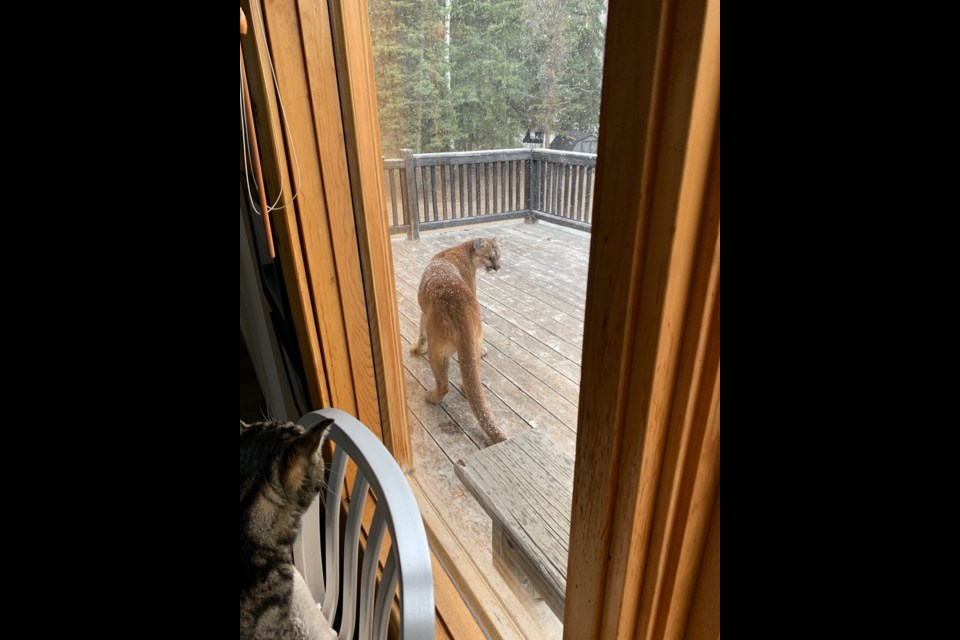BRAGG CREEK— A West Bragg Creek resident recently had the experience of a lifetime when a cougar decided to spend some time on her deck.
On Saturday (April 10) Teri Fullerton was walking on her rural property with her dog and cat. She had just gotten home and parked behind a Quonset and walked about 200 feet to the house.
It was a short walk to her home and as soon as she closed her door, she noticed a cougar standing on her deck looking in at her.
“I turned around and it was basically staring at me through the window. It was pretty shocking,” Fullerton said with a chuckle. “It was really, really, cool because I was safe in the house.”
She knocked on the window and the cougar turned to look at Fullerton letting her snap a photo of the animal staring right at her. Fullerton is no stranger to encounters with wildlife but it is rare to catch a candid perfect shot, she said with a laugh.
“It just turned around and looked right at me,” Fullerton said.
The cougar got a little spooked when Fullerton’s husband arrived home moments later and took off leaping over the deck railing into the forest.
It was snowing and the tracks left in the snow showed the cougar had walked right in Fullerton’s footsteps.
Fullerton has lived most of her life in the country and has placed game cameras around her rural property to catch wildlife, but never expected to have this close of an encounter with a cougar.
“I’ve got cats on my cameras before, but it's one thing to have them on your game cam and then to have them right there,” Fullerton exclaimed. “You expect a coyote, or a skunk or even a bear, but never a cat."
She added it was especially strange to see the cougar come out in the middle of the day.
In her whole life she has only seen three cougars, which made the experience all the more exciting.
Fullerton posted the image of the cat on a community Facebook page so others could keep an eye out for the cougar.
She has been diligently checking her game cameras, Fullerton said, but the cougar has not visited her property since the sighting.
Former Fish and Wildlife officer and owner of Bear Scare Ltd. Dan LeGrandeur said encounters with cougars are exceedingly rare.
“You should consider it a once in a lifetime opportunity,” LeGrandeur said. “Seeing a cougar out in the wild is a rarity. In my career, which has mainly been spent out in the wilderness, outside of dealing with the cougar on a professional level as a Fish and Wildlife officer, I’ve only seen two in the wild outside of work.”
The best step to take if you spot a cougar in the wild is to just let it go about its business.
“As a Fish and Wildlife officer the only time we would try and trap or relocate a cougar would be if it was constantly killing livestock, or if it was in a neighbourhood,” LeGrandeur said.
As a general rule, cougars are more scared of humans than humans are of them.
The big cats are different from bears as they do not become habituated toward people and do not become food-conditioned. Overall, he said, the animals are reserved and shy when it comes to being around people.
LaGrandeur said for most cougars if they do come in contact with a person, it is because the cat was curious, it is a chance sighting or in extremely rare circumstances they may have thought a person was prey.
On occasion, there may be a juvenile or inexperienced cougar hanging around a community killing smaller prey animals like cats or raccoons. These younger cougars, typically between the ages of one and two, are the problem cats Fish and Wildlife officers would normally deal with, he said, but they have also encountered older cats that have a difficult time fending for themselves.
If you encounter a cougar in the wild the most important thing is to move slowly and never turn your back on the animal. Running from the animal has the potential to kick start the chase instinct in the cat.
“Keep facing it, make yourself look as big and as large as possible. Put your arms above your head, yell, scream, throw rocks. Make yourself as big and intimidating as you can,” LeGrandeur said. “Treat it very much like you would a predatory bear.”
If you are out hiking or biking put a tree as a barrier between you and the cougar or use a bike. If out in the wild in a big group, move together and bring any small children into the middle of the group.
Bear spray is also an effective tool with cougars and can be used on all forms of wildlife as a form of protection.
“Treat them as wild animals, don’t ever approach them. Don’t panic,” LeGrandeur said. “Treat it as a special experience— Having a cougar in your presence largely means the ecosystem is healthy.”



